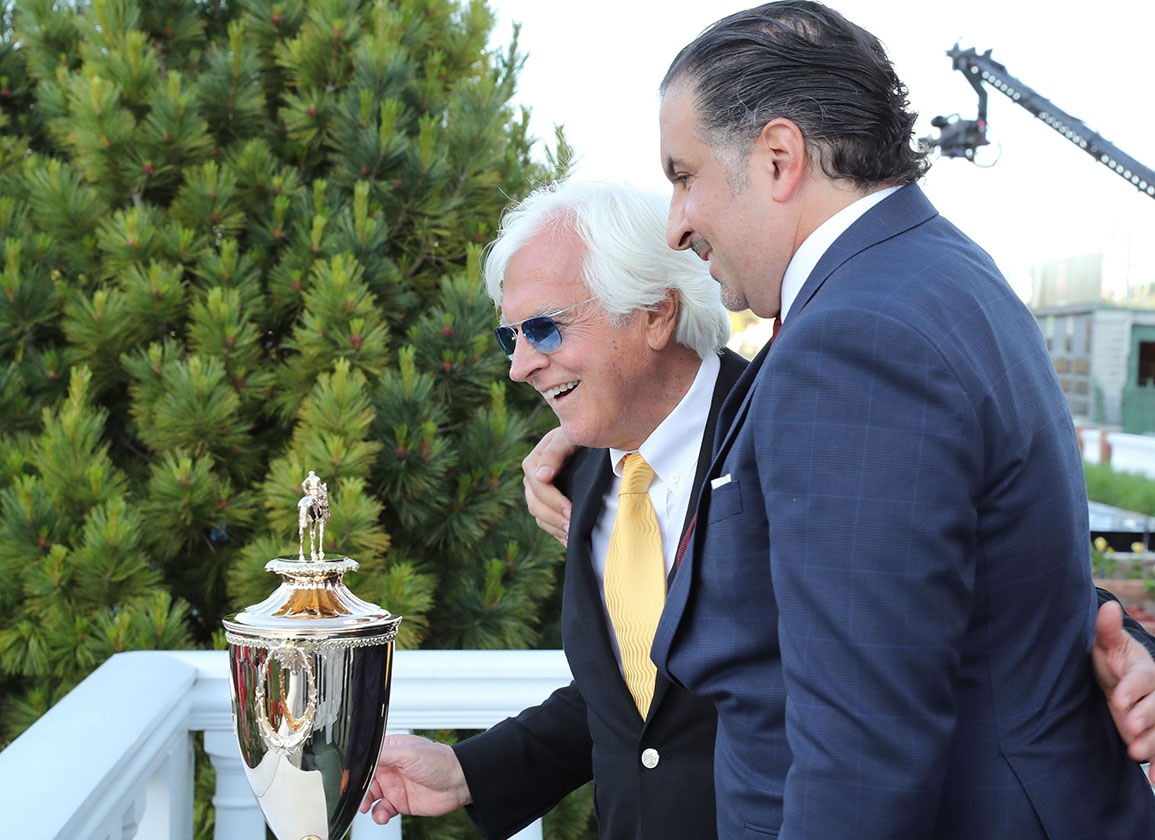By T. D. Thornton
The connections of recently disqualified GI Kentucky Derby winner Medina Spirit (Protonico) took to a Kentucky court Monday in an attempt to keep their equine drug positive penalizations from being enforced while their case gets appealed at the commission level.
Trainer Bob Baffert is facing a 90-day suspension and $7,500 fine for now-deceased Medina Spirit's betamethasone overage in the 2021 Derby. Owner Amr Zedan has been ordered by the KHRC to forfeit his colt's purse winnings. But the DQ of Medina Spirit from America's most important horse race will affect both men beyond those penalties, their Feb. 28 court filings argued.
“If I am suspended, I will be prevented from entering horses to race anywhere in the United States,” Baffert stated in an affidavit that accompanied an amended civil complaint and a request for a temporary injunction against the KHRC's rulings. “This is because any suspension imposed by Kentucky will be recognized through the reciprocal arrangements between the racing jurisdictions of each state. Certain races only come around once a year and are limited to horses of a particular age. Every day that I am prevented from entering horses in races is one day of lost opportunity that I can never regain, and for which I will be harmed.”
Baffert's KHRC suspension is set to run Mar. 8 through June 5. He has appealed the Feb. 21 ruling. But on Feb. 25 the KHRC denied him a stay against enforcing the penalties. Such stays are a common–but not mandatory–practice at most state racing commissions unless the infraction is considered overly egregious or if the penalized person is deemed to be dangerous.
“Moreover, any suspension will likely have the effect of harming my business for a significant period of time much longer than the suspension itself,” Baffert stated. “The suspension will precipitate horses currently in my care–worth tens of millions of dollars–being moved to other trainers because their owners cannot allow those horses to be excluded from participation in the lucrative races. This will effectively put me out of business in all states.”
Monday's filings by Baffert and Zedan in part amended their initial June 7, 2021, complaint in Franklin County Circuit Court that initially sought an injunction to keep the KHRC from allegedly violating their due process rights. The new version Feb. 28 asked for four forms of legal relief:
“1) For an Order of this Court granting Plaintiffs' appeal pursuant to KRS 230.320(2)(f) and staying Stewards Rulings 21-0009 and 21-0010 pending their appeal; 2) For an Order of this Court granting Plaintiffs an injunction pursuant to Civil Rule 65.04 staying Stewards Rulings 21-0009 and 21-0010 pending their appeal; 3) For their costs herein expended, including reasonable attorney fees; and 4) Any and all other relief to which they may appear entitled.”
The amended complaint outlined for the judge how the process of appeals and stays is supposed to work, according to the plaintiffs' perspective.
“Typically, given the preliminary nature of a Stewards Ruling, the KHRC stays any implementation of penalties imposed therein until all appeals are exhausted and there is a final and binding decision. This is in large part because the KHRC recognizes that irreparable harm will be suffered by licensees if they are forced to presently suffer the consequences of a ruling that is subject to being reversed later. For example, a trainer who is forced to serve days of a suspension now cannot ever get those days back if the ruling imposing the suspension is subsequently vacated.”
At a later point in the document, it explained, “Absent a stay of the Stewards Rulings, Zedan will be forced to return purse monies and Baffert will be prevented from pursuing his chosen profession and enjoying the fruits of his labor through the exercise of his state issued occupational license, in addition to having his reputation tarnished.”
The complaint also raises a new issue: That the KHRC is allegedly exceeding the suspension time frame that it is allowed to impose on Baffert for this sort of infraction..
“Further, even if a suspension was appropriate (which it is not), the KHRC rules only provide for a 30-60 day suspension and not 90 days,” the filing stated, citing 810 KAR 8:030, Section 4(3)(a). “Thus, even in the light most favorable to the KHRC, the suspension is unlawfully long.”
As the plaintiffs put it, such a purportedly unlawful suspension would unleash a cascade of irreparable harm upon the Hall of Fame conditioner.
“The owners of the horses Baffert trains, many of whom are at the pinnacle of the global Thoroughbred racing industry, are currently making decisions to protect their ability to race at numerous upcoming races, including the Triple Crown. A 90-day suspension would prevent Baffert from participating in the Triple Crown. Any suspension of Baffert which impacts his ability to enter horses in races across the country, including the Triple Crown, negatively impacts those decisions…”
As Baffert put it in his affidavit, “In California, where I am based, any suspension over 60 days will require me to vacate my barns and remove all signage. As a result, I will be effectively put out of business.
“Graded stakes are the most elite races and a Grade I stakes race is the highest level of racing in the industry. Graded stakes generally offer the largest purses, and are intended to showcase the best horses in the industry. All three Triple Crown races are Grade I stakes races. A 90-day suspension will prevent me from participating in any of those races in 2022.”
(Note: The GI Belmont S., the third leg of the Triple Crown, is scheduled this year for June 11, which actually falls outside of Baffert's KHRC penalization period.)
TDN could not obtain a comment from the KHRC prior to deadline for this story. The KHRC in the past has reiterated that it does not comment on pending litigation.
Not a subscriber? Click here to sign up for the daily PDF or alerts.






